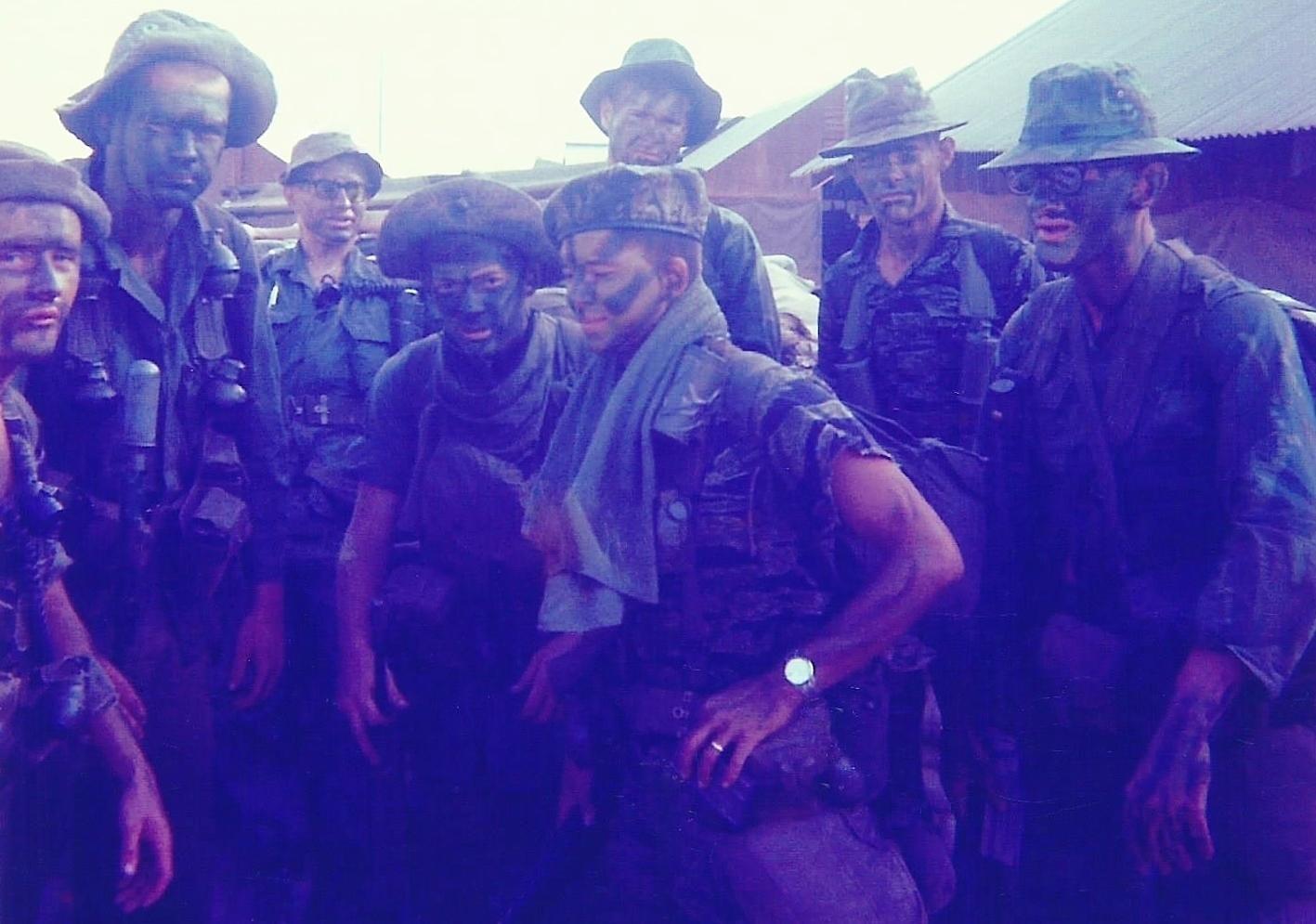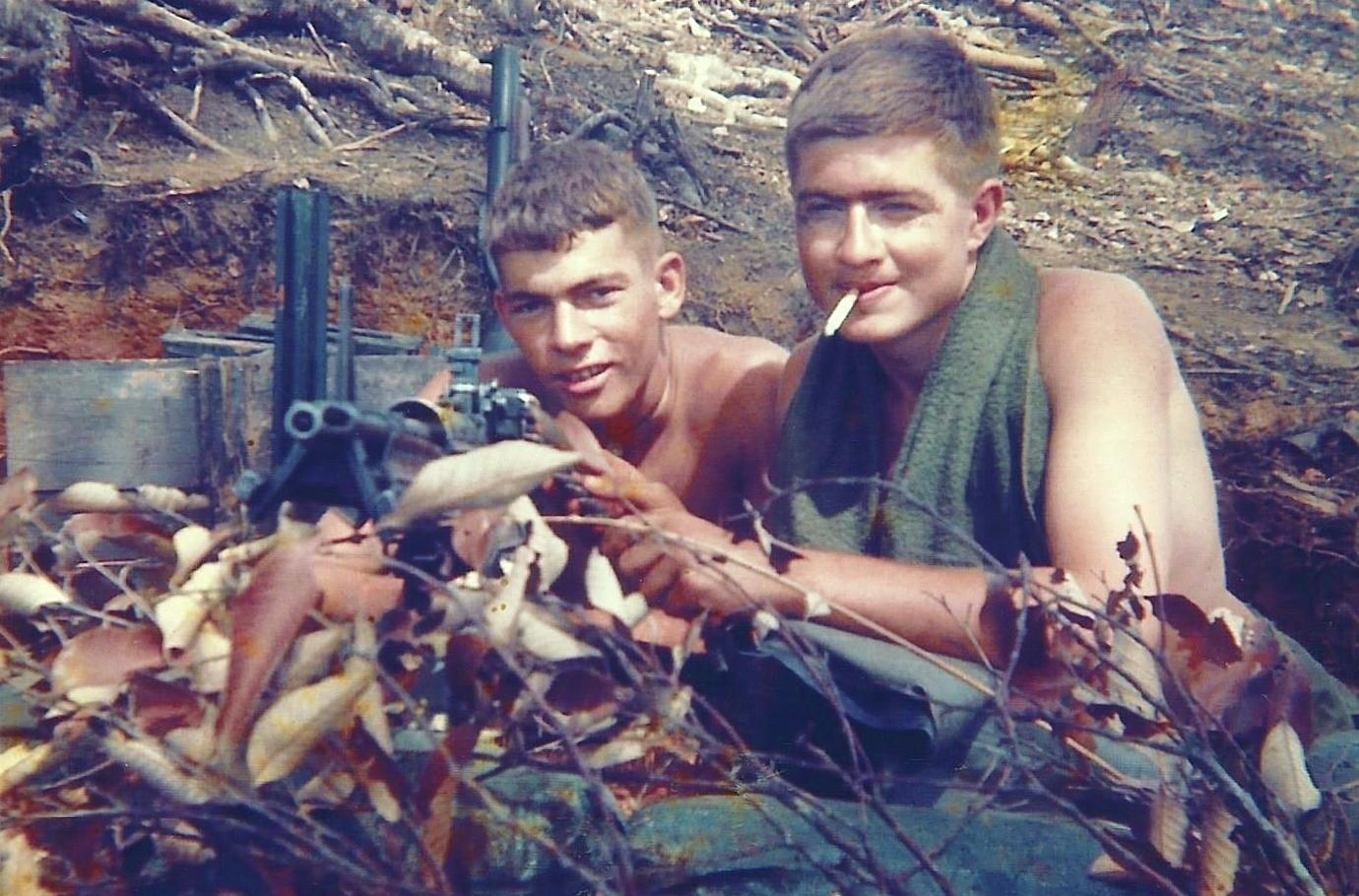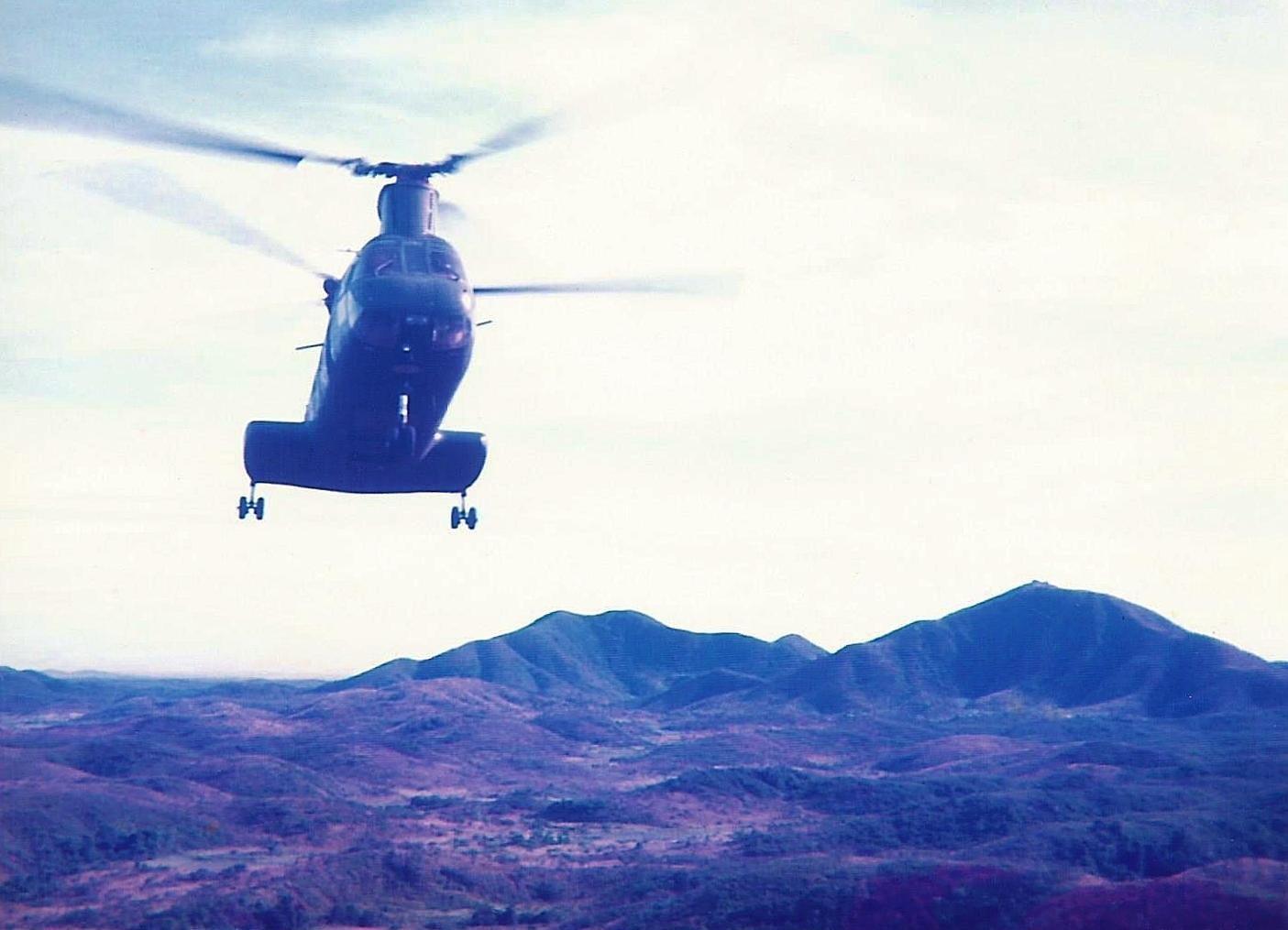


Author's Name: Thomas Griggs
Title: "Warbirds"
My most memorable times during two tours in the Vietnam War invariably involve helicopters.I grew up just 23 miles from downtown St. Louis and just a stone's throw from Scott Air Force Base. I still live there today, in Lebanon, Ill. Occasionally, military helicopters fly into and out of Scott. If I'm outside and hear them, I stop doing whatever it is I'm doing and watch those helicopters. If I'm inside the house, I run outside to watch those helos, and I am momentarily transported back to Southeast Asia.
During my 20 years of active duty in the U.S. Marine Corps, I jumped into and hopped out of Marine helicopters in Europe, Asia and all over the United States. However, my most memorable heliborne episodes took place in South Vietnam, during my first year in the Vietnam War, when I was a reconnaissance scout.
My recon team and I conducted four- and five-day patrols deep in the Annamites, far from any "friendlies," as we used call them – you know, the good guys, friendly troops, the Americans and South Vietnamese. We got to those far reaches of the mountain range aboard a helicopter, usually a CH-46, and four or five days later, a chopper would pick us up and take us back to our rear area. Taking us out and dropping us into the bush was called an insertion, while picking us up to go back to the rear was called an extraction.
You can say "chopper" instead of "helicopter," by the way. It's quite appropriate. I once read somewhere that "chopper" was not a good term for helicopter, but that it's OK to say "copter." Egad, man. A Marine would never say "copter." We used the term "chopper" almost as much as we used the term "birds" when referring to helicopters.
A recon team leader or a rifle platoon sergeant or a company gunny would say something like this: "Get your gear on, people! The birds are here!"
That's what I always said. Or something like this: "Saddle up, jarheads! The birds are on the way."
Note that I used the plural of bird, because four helicopters always were part of any and all recon insertions and extractions. You rode aboard a CH-46, and another CH-46 flew along in case your 46 got hit or shot down. The other two choppers were UH-1 Huey gunships, equipped with machine guns and mini-guns and 2.75-inch rockets, and they flew cover for us in case we got hit as we set down in the landing zone or as we were being extracted.
For a brief time in 1967, the CH-46s were grounded during an investigation into some kind of mechanical problem. Some old Sikorsky UH-34D Seahorses were called in to replace them, which made for some thrilling inserts and extracts. It was not especially easy to get into and out of a 34, and I ruined some good tiger-stripe cammies doing it, like when I tore out the knees as I charged into one of the old birds and crashed knees-first onto the metal deck or flooring of the aging Seahorse. I'm naturally rather clumsy, and it didn't help when the 34 crew chief gabbed me by the top of my rucksack and flung me into the chopper like he was flinging a salmon into a fishing boat. Yikes, my knees, man, my knees!
He was probably the same crew chief who kicked me out of a Seahorse as we hovered over a swamp in Leech Valley, southwest of Da Nang. We were being inserted, and the pilot had his old UH-34D hovering high – so high that when I stepped up to the doorway to jump out, I hesitated. Without any hesitation at all, the crew chief gave be a boot in the butt, and I was airborne with about 60 pounds of combat gear and dropping quickly into a shallow swamp. That was the craziest insertion of my wartime experience!
When I waded out of the swamp and onto a trail, I looked down and saw why the valley was called Leech Valley. Dark, evil-looking, blood-thirsty leeches were everywhere. The ones closest to me, right next to my boots, were erect and wriggling as if to be saying: "Welcome to our valley; we want to suck your blood, American Marine; we're going to suck your blood!"
I was glad that our first objective was to hike out of that valley and up into the hills. I couldn't get out of Leech Valley fast enough. It quickly had me forgetting how that crew chief had unceremoniously given me the boot.
A memory of clumsiness that I caught on film involved an extraction and a CH-46 Sea Knight that almost squashed me. We were at the end of a miserable, wet, chilly week on a hilltop in the mountains somewhere southwest of Hue, Vietnam, and the 46 was descending to extract us. I had an especially full rucksack on my back. With that pack and all my other gear, I was weighted down with probably 70 pounds.
I had my little Kodak Brownie 8 mm movie camera with me, and as the pilot brought his big bird down into the mountain forest opening, I had the camera rolling. Then that wonderful chopper jockey started creeping his 46 backward, right toward me, in order to safely fit into the landing zone. Before I could move, the bird was right over me and coming down. What a great shot, I thought, as I leaned back and pointed up. As I was ready to rapidly move out of the way, all that weight on my back toppled me backward, and my clumsy coordination could not counter my weight distribution and let me recover my balance. I suddenly was on my back, with the Sea Knight coming down right on top of me. I figured that if I was going to meet my end, I was going to film it, so I kept the camera rolling. Gung-ho, baby!
Fortunately for me, two of my teammates grabbed me by the top of my rucksack – kind of like that UH-34D crew chief had one time – and pulled me to safety. That 8 mm footage is on a little 50-foot reel of film somewhere in my Marine Corps footlocker. Someday, I must have it transferred to DVD. Everyone will be able to see clumsy Griggs once again escaping injury or death.
So far, one might be wondering why I love and respect chopper crews so much. Well, for the couple of times that it seems they were trying to do me in, there were a couple of hundred more times when they saved me, or made getting somewhere easy, or brought me and my Marines much-needed food, water, ammo and mail. Those were some of the most prized times of my life.
However, the times the birds showed up in the heat of battle are the times most seared into my memory. Every time my recon team got into a firefight, two Huey gunships would show up to help us. They got us out of countless jams. As soon as we'd get hit, I would get on the radio to report that we were in hot and heavy contact with the bad guys and to request Scarface. Scarface was the call sign of the Marine gunships. They flew in pairs, and their call signs would be, for example, Scarface 1-0 and Scarface 1-1. Talking on the radio, I would pronounce their call signs as "Scarface one-dash-zero" and "Scarface one-dash-one." When we would hear them approaching, our confidence soared.
"Mad Hatter, Mad Hatter, this is Scarface one-dash-zero, we should be approaching your position; do you have us in sight?"
"One-dash-zero, this Mad Hatter, we're at your two-o'clock. We're along the treeline of a small opening down here, and I'm in the middle with an air panel. I'll give you a mark-mark when you pass over us."
"Mark mark"
"Uh, roger, Mad Hatter, we've got ya. Keep your heads down now. Where's the bad guys?"
"One-dash-zero, be advised, they're mostly to our east and northeast, some as close as 30 meters."
"OK, Mad Hatter, we see some movement down there. Stay tight. We'll be makin' a few gun runs along your east."
Scarface would then proceed to kick ass. And we didn't stay tight very long. The gunships' firepower gave us the chance to "make our hat," as we used to say. We were a small recon team, deep in bad-guy territory. That means we could usually count on being outmanned and outgunned if we stumbled into the enemy. So we needed to make our hat, escape and evade, get the hell out of the area, and then carry on our reconnaissance mission.
Hey, Scarface. Thanks, y'all. You were always there when we needed you.
Swift was always there when needed, too – always there to extract us at the end of a patrol and sometimes to extract us in the middle of a battle. Swift was the call sign for the CH-46s, and I used the same lingo and numerical pronunciations to talk to Swift on the radio as when I talked to Scarface on the radio.
We loved the sound of the approaching helicopters on extraction day. The Hueys would arrive first, with the 46s right behind them. Swift pretty much knew where we'd be, because they could see the Scarface boys already checking out the area, but Swift would come up on the radio and start jabbering with us, too.
"Mad Hatter, this is Swift one-dash-zero; you have us in sight yet?"
"Swift one-dash-zero, this Mad Hatter, you're headed right at us; we're at your twelve-o'clock."
"Roger that, Mad Hatter; we'll be there most ricky-tick."
"Roger, Swift. Be advised, our last enemy contact was two days ago, about two clicks east of here. Right now, the wind is out of the south at about, uh, 10 knots, and the best approach would probably be from the north. If you take any fire, it would probably come from that ridge along the west. Do you need us to pop a smoke?"
"Roger, go ahead and pop one for me."
"One-dash-zero, Mad Hatter, stand by for yellow smoke. We are ready to go home, sir."
There were times when extraction didn't go so easily, times that we did take enemy fire, and things got real sporty. And there were times when we were already taking fire, and the chopper crews were coming out to us to pull us out of the bush before we were not only outgunned, but before we were overrun. Fortunately, that didn't happen much – I mean, that they didn't often have to come and rescue us.
Yo, Swift. Thanks, gentlemen. It was always a great ride home with y'all.